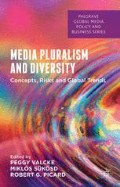Abstract
In the United States (U.S.), diversity, rather than pluralism, has traditionally been one of the overriding goals of media policy (Napoli 1999). The concept of diversity overlaps to some extent with the concept of pluralism in a variety of ways (see Karppinen 2013), as will likely become clear in the discussion that follows. Diversity policy — and diversity measurement — have a long history in the U.S. At various times, policymakers in the U.S. have emphasized a variety of different dimensions of diversity, ranging from the diversity of sources and viewpoints, to the diversity of program types, to the demographic diversity of the employees within media organizations (Napoli 1999).
Access this chapter
Tax calculation will be finalised at checkout
Purchases are for personal use only
Preview
Unable to display preview. Download preview PDF.
References
Baker, C.E. (2006) Media Concentration and Democracy: Why Ownership Matters (New York: Cambridge University Press).
Baker, C.E. (2008/2009) ‘Viewpoint Diversity and Media Ownership’, Federal Communications Law Journal, 61, 651–671.
Cooper, M. (2003) Abracadabra! Hocus Pocus! Making Media Market Power Disappear with the FCC’s Diversity Index (Washington, DC: Consumer Federation of America).
Federal Communications Commission (2001) ‘FCC Chairman Powell Announces Creation of Media Ownership Working Group’ [News release], http://www.fcc.gov/Bureaus/Miscellaneous/News_Releases/2001/nrmc0124.html [accessed 27 December 2004].
Federal Communications Commission (2002) ‘FCC Releases 12 Studies on Current Media Marketplace’ [News release], http://hraunfoss.fcc.gov/edocs_public/attachmatch/DOC-226838A1.pdf [accessed 27 December 2004].
Federal Communications Commission (2003) ‘2002 Biennial Regulatory Review’, Report and Order and Notice of Proposed Rulemaking, 18 FCC Rcd. 13620.
Federal Communications Commission (2012, 6 February) ‘The Office of Communications Business Opportunities and the Media Bureau Announce the Release of a Request for Quotation for Study Examining the Critical Information Needs of the American Public.’ BO Docket No. 12– 30 Public Notice, http://transition.fcc.gov/Daily_Releases/Daily_Business/2012/db0206/DA-12-156A1.pdf [accessed 24 April 2012].
Friedland, L., Napoli, P., Ognayanova, K., Weil, C. and Wilson III, E.J. (2012) ‘Review of the Literature Regarding Critical Information Needs of the American Public’, Report Prepared for the Federal Communications Commission, http://transition.fcc.gov/bureaus/ocbo/Final_Literature_Review.pdf [accessed 19 May 2013].
Hill, B.C. (2006) ‘Measuring Media Market Diversity: Concentration, Importance, and Pluralism’, Federal Communications Law Journal, 58, 169–194.
Ho, D.E. and Quinn, K.M. (2008/2009) ‘The Role of Theory and Evidence in Media Regulation and Law: A Response to Baker and a Defense of Empirical Legal Studies’, Federal Communications Law Journal, 61, 673–713.
Just, N. (2009) ‘Measuring Media Concentration and Diversity: New Approaches and Instruments in the U.S. and Europe’, Media, Culture & Society, 31(1), 97–117.
Karppinen, K. (2006) ‘Media Diversity and the Politics of Criteria: Diversity Assessment and Technocratization of European Media Policy’, Nordicom Review, 27(2), 53–68.
Karppinen, K. (2013) Rethinking Media Pluralism (New York: Fordham University Press).
KU Leuven — ICRI, Jönköping International Business School — MMTC, Central European University — CMCS, Ernst & Young Consultancy Belgium (2009) Independent Study on Indicators for Media Pluralism in the Member States — Towards a Risk- Based Approach (Final Report and Annexes: User Guide, MPM, Country Reports, prepared for the European Commission) (Brussels: European Commission), http://ec.europa.eu/digital-agenda/en/independent-study-indicators-media-pluralism (‘EU MPM Study’).
Litman, B. (1979) ‘Television Networks, Competition and Program Diversity’, Journal of Broadcasting, 23, 393–409.
Lloyd, M. and Napoli, P. (2007) Local Media Diversity Matters: Measure Media Diversity According to Democratic Values, Not Market Values (Washington, DC: Center for American Progress).
Marcus, A. (2007) ‘Media Diversity and Substitutability: Problems with the FCC’s Diversity Index’, I/S: A Journal of Law and Policy for the Information Society, 3, 83–115.
Napoli, P.M. (1997) ‘Rethinking Program Diversity Assessment: An Audience-Centered Approach’, Journal of Media Economics, 10(4), 59–74.
Napoli, P.M. (1999) ‘Deconstructing the Diversity Principle’, Journal of Communication, 49(4), 7–34.
Napoli, P.M. (2001) Foundations of Communications Policy: Principles and Process in the Regulation of Electronic Media (Cresskill, NJ: Hampton Press).
Napoli, P.M. (2008) ‘Paradoxes of Media Policy Analysis: Implications for Public Interest Media Regulation’, Administrative Law Review, 60(4), 801–812.
Napoli, P.M. and Gillis, N. (2006) ‘Reassessing the Potential Contribution of Communications Research to Communications Policy: The Case of Media Ownership’, Journal of Broadcasting & Electronic Media, 50(4), 671–691.
Nielsen Media Research (2002) Consumer Survey on Media Usage, Media Ownership Working Group Paper No. 8 (Washington, DC: Federal Communications Commission, http://hraunfoss.fcc.gov/edocs_public/attachmatch/DOC- 226838A17.pdf [accessed 3 January 2005].
Noam, E. (2009) Media Ownership and Concentration in America (New York: Oxford University Press).
Owen, B. (2004) Confusing Success with Access: ‘Correctly’ Measuring Concentration of Ownership and Control in Mass Media and Online Services, Stanford Law School, John M. Olin Program in Law and Economics, Working Paper 282.
Prometheus Radio Project v. Federal Communications Commission (2004) 373 F. 3d 372.
Scott, B. (2004) ‘The Politics and Policy of Media Ownership’, American University Law Review, 53, 645–677.
Waldman, S. and the Working Group on Information Needs of Communities (2011) The Information Needs of Communities: The Changing Media Landscape in a Broadband Age (Washington, DC: Federal Communications Commission).
Editor information
Editors and Affiliations
Copyright information
© 2015 Philip M. Napoli
About this chapter
Cite this chapter
Napoli, P.M. (2015). Assessing Media Diversity in the U.S.: A Comparative Analysis of the FCC’s Diversity Index and the EU’s Media Pluralism Monitor. In: Valcke, P., Sükösd, M., Picard, R.G. (eds) Media Pluralism and Diversity. Palgrave Global Media Policy and Business. Palgrave Macmillan, London. https://doi.org/10.1057/9781137304308_8
Download citation
DOI: https://doi.org/10.1057/9781137304308_8
Publisher Name: Palgrave Macmillan, London
Print ISBN: 978-1-349-56626-6
Online ISBN: 978-1-137-30430-8
eBook Packages: Palgrave Media & Culture CollectionLiterature, Cultural and Media Studies (R0)

